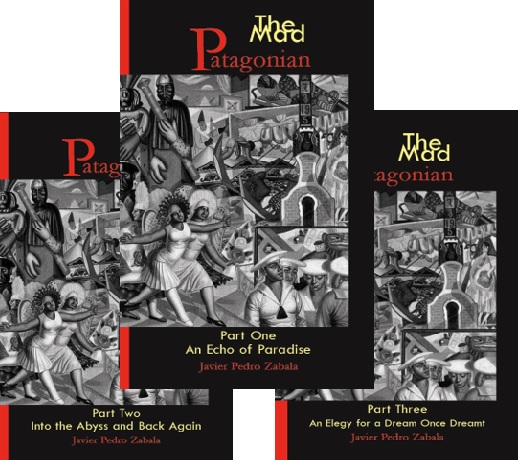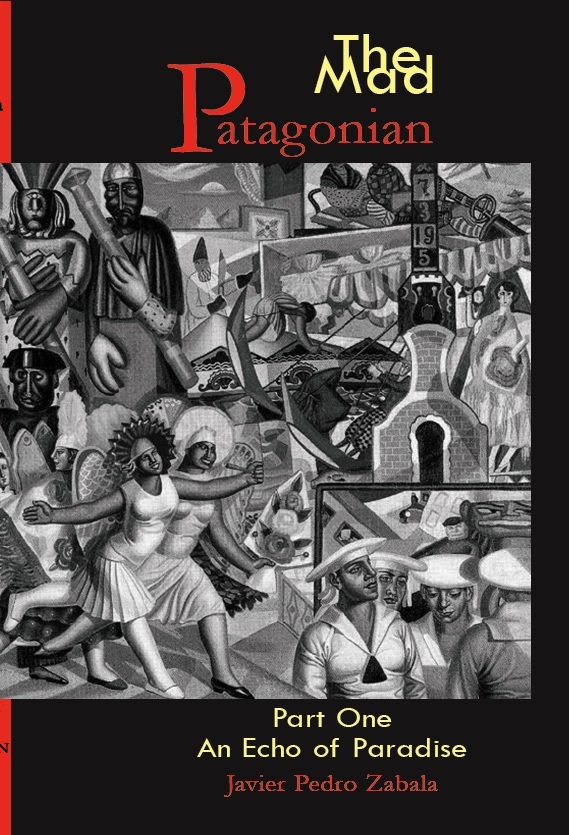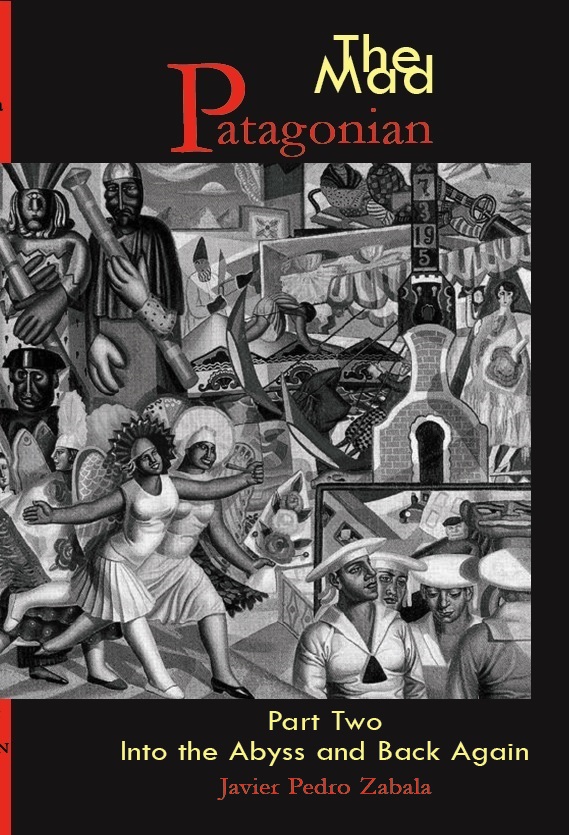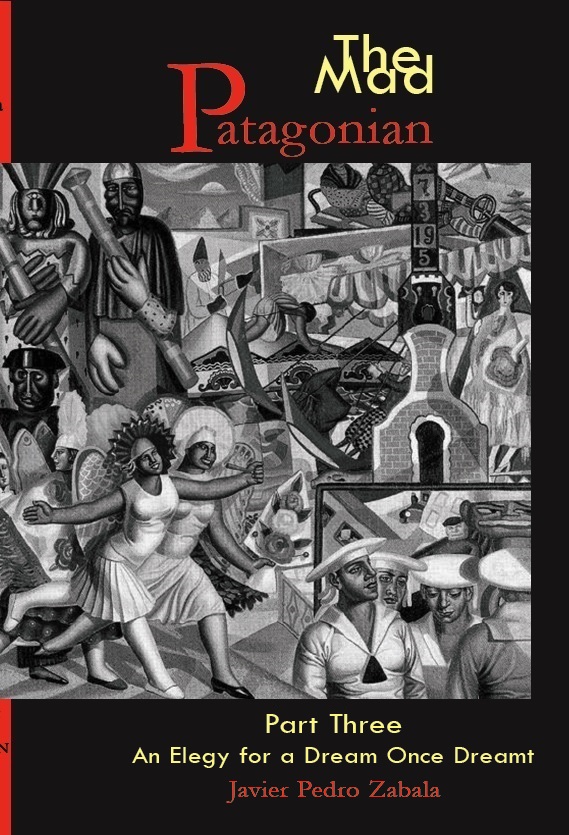Good Friends, Good Books, and a Sleepy Conscience: This is the Ideal Life!

Javier Pedro Zabala (pseudonym) Tomás García Guerrero (fictitious translator) - Peter Damian Bellis (Editor)
Part One: An Echo of Paradise
388 pages; Trade paperback $12.95
ISBN: 978-1-955823-00-5
Part Two: Into the Abyss and Back Again
742 pages; Trade paperback $17.95
978-1-955823-01-2
Part Three: An Elegy for a Dream Once Dreamt
742 pages; Trade paperback $12.95
978-1-955823-02-9
ALL THREE VOLUMES: $39.70 US (includes shipping
and taxes). European orders, Australian orders, and other International orders are more in price.
See listing of separate volumes below for summaries of each volume.
First edition published in 2018.
Second edition released 2021.
The Mad Patagonian (second edition) is now available as a three-volume set (Part One: An Echo of Paradise; Part Two: Into the Abyss and Back Again; and Part Three: An Elegy for a Dream Once Dreamt). The complete book is a multi-generational epic spanning three centuries and five continents in which members of the Escoraz family are looking to find true love (and some version of paradise) in a world that has been torn apart by the random even bestial violence of Fascism in all its forms. The nine interconnected novellas that make up the three volumes of The Mad Patagonian take the reader backwards through time and history, a journey which begins in that sunny paradise we call Florida and the familiar urban/suburban American landscape of Jacksonville and Miami in the 1990s. From Florida we then travel to the historical melting pot of Logroño, Spain during the latter part of the nineteenth century (1870-1899), where the mythic stories of two psychics, Escolástica and Isabel Escoraz Vda De Miranda, unfold. From Spain we then head to Santiago, Cuba, circa 1900-1907, a tumultuous period in Cuban history when forgotten poets lingered in the shadows before descending into oblivion, the determined followers of José Martí were still seeking liberty and equality for every Cuban citizen, and brujería magic was a force to be reckoned with. Next we travel to a film nourish 1950s Havana, with swanky, exclusive nightclubs overflowing with the sounds of sultry danzón singers; a world in which corrupt government officials and remorseless gangsters who read Pirandello and find themselves in a battle to the death with a mysterious group of German anarchists and ex-spies who believe they are working for a sinister, alien (as in outer space) race intent on subjugating the Earth; and then we find ourselves in a contemporary parallel universe America (with one Kafkaesque detour thru parts of France, Germany, and the city of Prague) where an aging Basque immigrant who fought Franco, a World War One tank commander, Latin-American revolutionaries, CIA operatives, FBI agents, ex-poets, ex-priests, atheists, an internationally acclaimed porn star, an expert on Nazi mysticism and the occult, a modern-day saint, a Hollywood movie director who was nominated for an Academy Award, and a hairdresser from Buenos Aires who once cut the hair of Jorge Borges in a hotel room in New York City, all take their turn on center stage, and the hope of finding paradise takes on profoundly spiritual dimensions.

Part One: An Echo of Paradise 388 pages; Trade paperback $12.95 ISBN: 978-1-955823-00-5
Part One: An Echo of Paradise tells three stories. The first story focuses on the journey of two teachers searching for paradise: Travis Lauterbach, who is love with Tommie Rodriguez, the great-great-granddaughter of Andres Escoraz; and an ex-hippie named Mick, who acts as a mentor to Travis. The second story is about Xavier and Soledad Mendoza (the grandchildren of Isabel), what their lives were like in Spain, how they came to the United States, and how they own a brothel/café called The Patagonian Café in Little Havana, Miami, and how they come to know the two teachers from the first story. This story is told by Xavier as he nears the end of his life. The third story is about a miscreant named Malachi, who works for Bull and Horse Velázquez, who own a pornography film company. Malachi is dating a beautiful woman named Gisela, who works at The Patagonian Café. He then runs afoul of Bull and Horse (who are determined to kill Malachi), and so involves everyone he knows in trying to escape (including Xavier and Soledad and the two teachers). Part One ends with a scene presented as a scene from a movie script titled: THE HAIL OF BULLETS SCENE AT LA MAMACITA’S.

Part Two: Into the Abyss and Back Again 742 pages; Trade paperback $17.95 978-1-955823-01-2
Part Two: Into the Abyss and Back Again also tells three stories. The first is the mythic story of how Escolástica Escoraz Vda De Miranda and her uncle Andres journeyed to Santiago, Cuba, circa 1900-1907. From Santiago they travel to Havana. Andres settles in Havana, but Escolástica, believing her life is in danger, leaves Cuba for Puerto Rico, where she takes refuge in a convent. The second story takes place in Havana (1920-1958) and is set against a backdrop of swanky, exclusive nightclubs overflowing with the sounds of sultry danzón singers. The story is primarily about Oscar Garcia Raimundi, a protégé of a second-tier gangster, Luis Sarabia, and his boss, the remorseless Giuseppe Federico DiCarla. (We also learn the life story of Federico.) The gangsters are battling a group of mysterious anarchists for control of Havana. These anarchists are from Germany, ex-Nazis mainly, and believe they are working for a sinister, alien (as in outer space) race intent on subjugating the Earth. How Oscar escapes from Cuba and what happens to the others is the essence of this second story. The third story is about what happens to Oscar after escaping to Florida. This story is told from the perspective of Isadora Calzada (the granddaughter of Escolástica Escoraz Vda De Miranda), who marries Oscar in secret and then lives out her life with Oscar until Oscar is murdered. This third story concludes with an investigation of the murder by a Miami homicide detective who soon discovers that the CIA is involved.

Part Three: An Elegy for a Dream Once Dreamt 742 pages; Trade paperback $12.95 978-1-955823-02-9
Part Three: An Elegy for a Dream Once Dreamt also tells three stories. The first is about a Jesuit priest named Father Anton Kreutner, whose life intersects and impacts the life of Emilio Calzada (Isadora’s brother). The question this first story focuses on is existential: why does Father Anton Kreutner suddenly quit the priesthood at the age of eighty. The second story focuses on the quest of Tommie Rodriguez to find out what happened to Travis and Mick and leads to Little Havana, Miami and The Patagonian Café. The third story is about what happened to Travis. Part Three also contains an Afterword by the author and a section titled The Lost Poets of World War One, which was written as a companion piece to The Mad Patagonian and features the biographies of three of the fictitious poets that grace the pages of The Mad Patagonian as well as samples of poetry from each of the poets.

Praise for The Mad Patagonian
“After reading Proust, Virginia Woolf questioned if anything remained to be written. Javier Pedro Zabala’s encyclopedic, multi-generational pageturner, The Mad Patagonian, is a strong, if belated, answer. The book is vast and, like Borges’s aleph, appears to contain everything; its scope and vision recall Carlos Fuentes, Gabriel García Márquez, Roberto Bolaño, and Sergio de la Pava.”
Chris Via, Rain Taxi Review of Books, Fall 2018 Print Edition (Click to read the COMPLETE REVIEW). * * * * * * * * * * * * * * *
"Mahler said of the symphony that it should embrace the world, and the really great novels of the 20th/21st centuries: Gravity’s Rainbow, Infinite Jest, Underworld, 2666, seem to have also embraced this view. The Mad Patagonian should rightfully take its place alongside them."
book critic Tom Murr of The Lectern (Click to read the COMPLETE REVIEW). * * * * * * * * * * * * * * *
Read a review of The Mad Patagonian by book critic L. S. Popovich in Speculative Fiction and Art.
“The Mad Patagonian is a very intelligent novel, enviably so, which will leave you wondering where reality ends and fiction begins. Indeed, it is precisely this question that leads the reader, at least this reader, into the book, into its layered complexity and variously fascinating and conflicted characters. The Mad Patagonian is a crazy, fun, profound, brilliant book.”
Pablo F. Medina (author of seventeen books,
including the novel The Cigar Roller, a Book Sense
Notable for 2005, Cubop City Blues, 2012,
and The Cuban Comedy, 2019)
* * * * * * * * * * * * * * *
“Epic in proportion, capaciously endless in breadth and depth, The Mad Patagonian submerges its reader into seemingly bottomless seas of Cuban history, mythology, and chismes that surface as a rollicking, evocative, glistening, incomparable and peerless novel.”
H. G. Carrillo, author of Loosing My Espanish
* * * * * * * * * * * * * * *
“The Mad Patagonian is a beautiful work. The writing is exquisite. And the story, my oh my, the story is heavenly.”
Susan Wingate (winner of a 2015 USA Best Books Award for fiction for The Deer Effect)





























